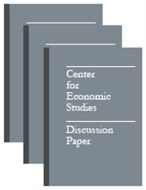Trade Liberalization and Labor-Market Outcomes: Evidence from U.S. Matched Employer-Employee Data
Trade Liberalization and Labor-Market Outcomes: Evidence from U.S. Matched Employer-Employee Data
Abstract
We use matched employer-employee data to examine outcomes among workers initially employed within and outside manufacturing after trade liberalization with China. We find that exposure to this shock operates predominantly through workers' counties (versus industries), that larger own industry and downstream exposure typically reduce relative earnings, and that greater upstream exposure often raises them. The latter is particularly important outside manufacturing: while we find substantial and persistent predicted declines in relative earnings among manufacturing workers, those outside manufacturing are generally predicted to experience relative earnings gains. Investigation of employment reactions indicates they account for a small share of the earnings effect.
Others in Series
Working Paper
Working Paper
Working Paper




